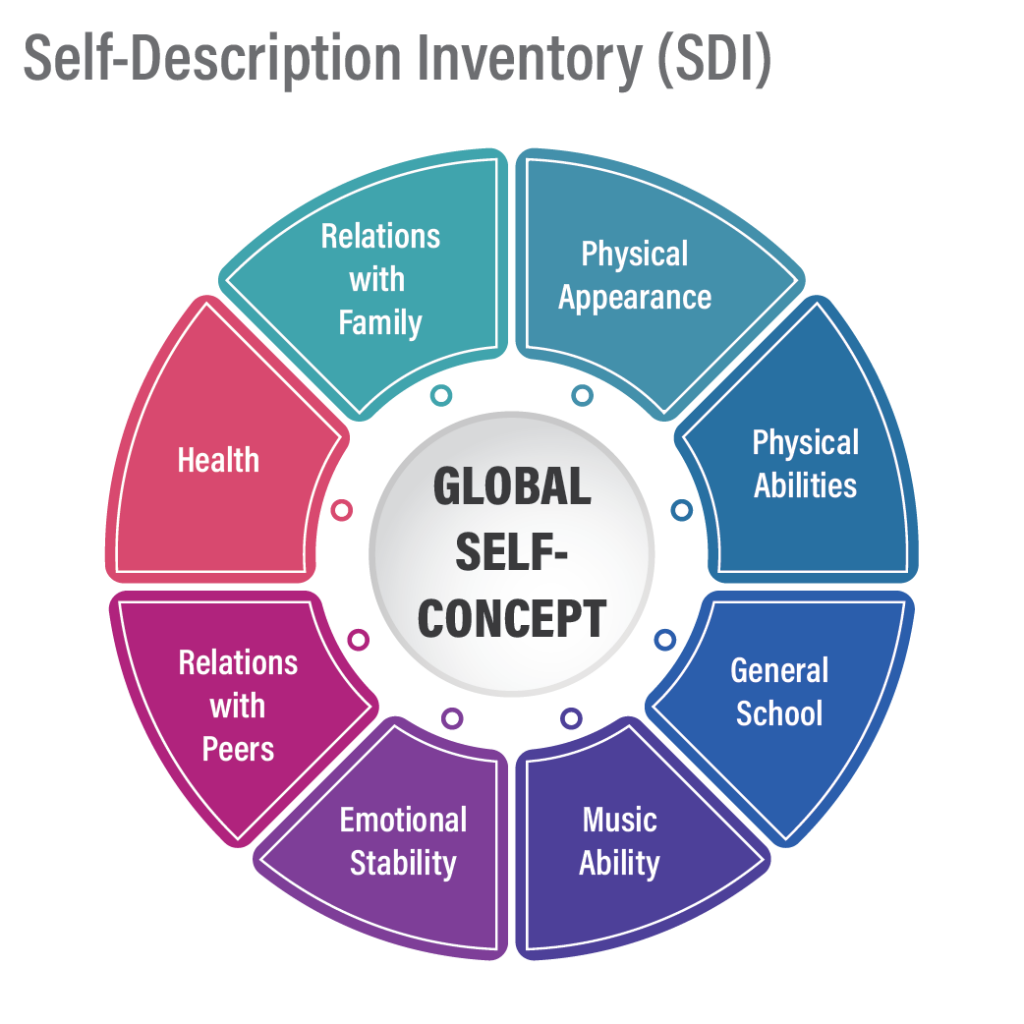Research and Publications

This section focuses on
three research instruments used, namely: The Self-Description Invetory
(SDI), The Perceived Parental Behaviour Inventory (PPBI) and The Perceived
Teacher Behaviour Inventory (PTBI). These Instruments are available in
English, Afrikaans, French, IsiNdebele, IsiXhosa, IsiZulu, Sepedi, Setswana,
Siswati, Tshivenda and Xitsonga. The SDI has also been used in the interational
community for research purposes.
To follow are details of the Instruments and Papers published using the Schedules.

SDI I & II
The
Self-Description Inventory (SDI) I & II. The
Self-Description Inventory is a multifaceted self-concept instrument which
measures self-esteem on a response scale which varies between ‘5 = I Agree Very
Much’ and ‘1 = I Disagree Very Much’. A brief description of the SDI scales and
examples of items are as follows:
Relations with family
(FMLY): This
sub-scale refers to individuals' perceptions of interactions with family.
Examples are, ‘My family loves me’, ‘I feel my family does not care for me’ and
‘I feel I am an important member of my family’.
General
school (SCHL): This
sub-scale refers to individuals' perceptions of interest in and enjoyment of
school in general. Examples are, ‘I like most school subjects’, ‘I enjoy the
time I spend in class’ and ‘The work I do at school is very important to me’.
Physical
abilities (PHYS): This
sub-scale refers to individuals' perceptions of skills and interest in sports
and physical activities. Examples are, ‘I enjoy sports and games’, ‘I am a good
athlete’ and ‘I feel energetic most of the time’.
Physical
appearance (APPR): This
sub-scale refers to individuals' perceptions of physical appearance. Examples
are, ‘I am satisfied with my appearance’, ‘I like the way I look’ and ‘My
friends do not find me attractive’.
Emotional
stability (EMOT): This
sub-scale refers to individuals' perceptions of emotional stability. Examples
are, ‘I do not cry easily’, ‘I get hurt easily when someone shouts at me’ and
‘Most of the time I feel unwell’.
Music
ability (MUSC): This
sub-scale refers to individuals' perceptions of interest in and enjoyment of
music. Examples are, ‘I love music’, ‘When music is played or when people sing
I feel good’ and 'Music to me does not make any difference’.
Relations with peers
(PERS): This
sub-scale refers to individuals' perceptions of interactions with peers.
Examples are, ‘I am well liked by others of my age’, ‘It is difficult for me to
make friends’ and ‘I feel that I am not well liked by others of my age’.
Health
(HLTH): This
sub-scale refers to individuals' perceptions of physical wellbeing. Examples
are, ‘I am in good health’, ‘I care for my body to the best of my ability’ and
‘I feel happy with the state of my health’.
Global Self-concept.

PPBI I & II
The Perceived Parental Behaviour Inventory (PPBI) I & II. The Perceived Parental Behaviour Inventory is a multidimensional instrument which measures perceived behaviours of parents on a response scale which varies between ‘5 = I Agree Very Much’ and ‘1 = I Disagree Very Much’. A brief description of the PPBI scales and examples follows:
Support, interest and
encouragement (STCT): This sub-scale refers to individuals'
perceptions of parents as being supportive, demonstrating interest in them and
also being a source of encouragement. Examples are, ‘My parents support me
in the things I do’, ‘My parents are concerned about what I do’ and ‘My parents
encourage me to use my own ideas’.
Expectations (PTTN): This
sub-scale refers to individuals' perceptions of parents' positive expectations. Examples are, ‘My
parents want me to work hard at school’, 'My parents would like me to have good
marks in school’ and ‘When I pass in this class my parents will want me to
continue my studies’.
Participation (PTPN): This sub-scale refers to individuals' perceptions of parental participation in schoolwork. Examples are, ‘Most of the time my parents look at my schoolwork’, ‘My parents encourage me to complete my schoolwork’ and 'My parents discuss my progress in school with each other.'

PTBI I & II
The Perceived Teacher Behaviour Inventory (PTBI)
I & II. The Perceived Teacher Behaviour Inventory is a multidimensional
instrument which measures the perceived behaviours of teachers on a response
scale which varies between ‘5 = I Agree Very Much’ and ‘1 = I Disagree Very
Much’. A brief description of the PTBI II scales and examples follows:
Support interest and
encouragement (STCT): This sub-scale refers to individuals'
perceptions of teachers as being supportive, demonstrating interest in them
and also being a source of encouragement. Examples are, ‘My teachers
care about me’, ‘My teachers make me feel confident in my schoolwork’ and ‘My
teachers are satisfied with my school reports’.
Expectations (PTTN): This
sub-scale refers to individuals' perceptions of teachers’ positive
expectations. Examples are, ‘My teachers think I can do well at school’, ‘My
teachers think that it is important for me to go to school and 'My teachers, think
that I can continue my education after high school'.
Participation (PTPN): This sub-scale refers to individuals' perceptions of teachers'
spending time and sharing activities with them. Examples are, 'My teachers
know what I am studying in school', 'When I am doing my schoolwork, my
teachers do not allow other things to interfere with it' and 'My teachers
encourage me to stay at school and study'.
Nurturing (NTRG): This sub-scale refers to individuals' perceptions of teachers' behaviours that promote psychological growth. Examples are, 'My teachers treat me well', 'I feel I cannot tell my troubles freely to my teachers' and 'I want to be like my teachers'.


